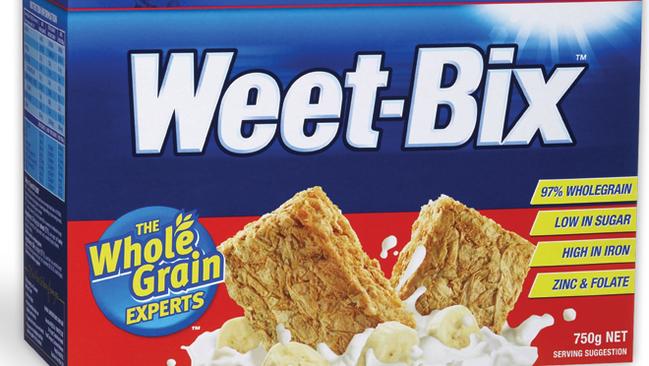Why Chinese online shoppers are paying $50 for a box of Weet-Bix
IT’S, dense, dry, and practically tasteless. But there’s a very simple formula to how this humble breakfast product became sexy.

THE dense, dry, cakes of every Australian’s childhood breakfast table memories have become one of the hottest products on the market in China.
That’s right, the humble Weet-bix is the next big thing when it comes to China’s social media based obsession with Australian products.
Boxes of Sanitarium’s most popular breakfast product, which go for between four and five dollars in Aussie supermarkets are being sold for upwards of $50 by local exporters on Chinese social media sites, taking over Australian-made baby formula and paw paw ointment as must-haves from Down Under.
The question on everybody’s lips, of course, is how did the familiar, high-fibre, edible bricks of wheat become sexy?
It was the age old celebrity endorsement that sparked the huge spike in demand, resulting in sellers being able to massively up their costs.
A popular Chinese drama featured the product, sending demand soaring.
According to Chinese marketing expert Livia Wang of Access China, the phenomenon that has seen Weet-Bix sales soar should be seen as a great opportunity for Australian producers.
She says that while products like Lucas’ Paw Paw Ointment and now Weet-Bix have become famous and in-demand mostly by chance endorsements in China, it’s time for other companies to start taking notice.
“I have to say it’s pretty unpredictable,” she says of the phenomenon that saw consumers clamour for both products.
“The situation (with Weet-Bix) happened because the celebrity was shown with the product and then the demand generated.
“Who is the next hero product? We don’t know. It depends who is lucky to be picked up by celebrities, but I think it’s actually an opportunity for Australian brands.”

Ms Wang says Australian companies have been taking little advantage of the influence of Chinese celebrities and social media giants, leaving the popularity of their product up to chance.
“It can be quite expensive to pay for a product to be endorsed, but the situation could be a celebrity to feature your product on (social media site) Weibo, or daigous (online sellers) recommend some of the products, they become very popular and can be sold for much, much higher price,” she said.
Though Weet-Bix is at the moment selling for up to 10 times its shelf price online, Ms Wang believes the market will soon level out.
“Even if you are selling to China, at the moment you can sell $50 for Weet-Bix, it’s because you need to ship the product, it takes two months to create market gap once you settle the supply,” she said.
“I don’t believe there is a formula for the price. It starts off very high and then it will balance. But products that are very high demand for Australia can usually be sold at a higher price.”
Weet-Bix has joined the ranks of products like baby formula and vitamin supplements which are still sold for multiple times the price they go for in Australia.
The extreme demand for baby formula led to a shortage in Australian stores earlier this year, prompting stores to restrict sales which outraged Australian families who believed their children were having to go without because of offshore buyers hoarding the product.
Although the onselling of Australian products has caused major trouble in the past, Ms Wang says it’s important products’ new-found popularity in China isn’t seen as a bad thing for Australian consumers, but an opportunity for companies.
“Look at the potential, “ she said.
“If it can happen in this way by chance, and the companies response to it reactively, we can make it manually happen, push the strategy, and push demand in China.”




